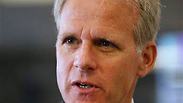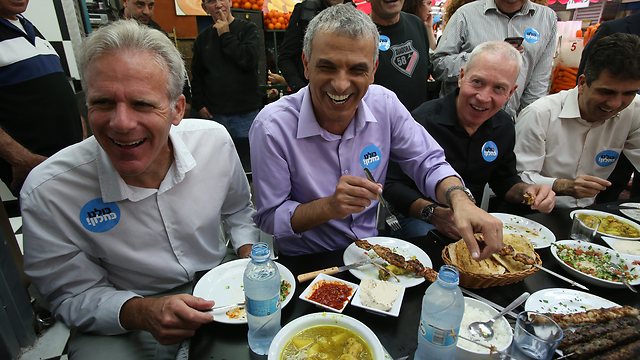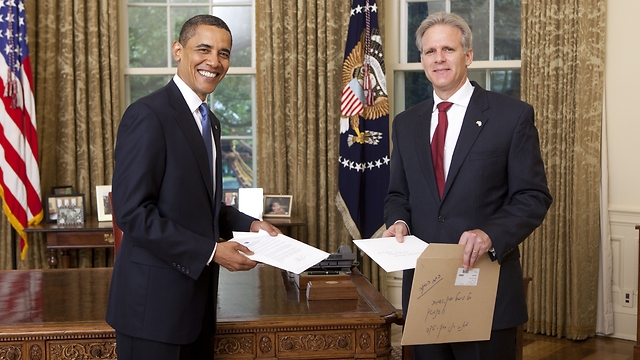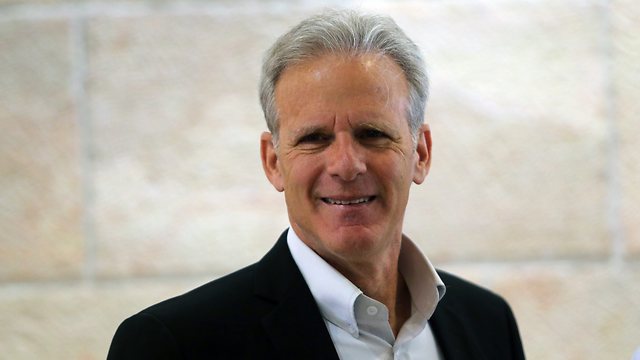
Michael Oren: Criticism of Obama had to be made
Former Israeli envoy to Washington and current Knesset legislator accuses US president of adopting Arab narrative that Jews are in Israel because of the Holocaust; 'The Cairo speech was twice as long as Obama's inauguration speech. This is an indication of the importance he gives the Muslim world,' he says.
The biggest debate among historians is where the story begins. Michael Oren is a Zionist historian. He writes from that point of view, he became an ambassador because of that point of view and it was that point of view that led him to Moshe Kahlon's strange party Kulanu. His beginning is positive, at least in my opinion. The ending is reserved for others.
I met him when he was Israel's ambassador to Washington and we became friends out of appreciation - at least on my behalf.
On one of the evenings I spent with him in Washington, we went to a formal Chabad dinner. We shared a table with Steny Hoyer, number 2 in the Democratic Party, and the Republican Chairman of the House of Representatives, John Boehner. They treated Oren like a rock star. When he went up to the podium to speak, the men fixed their ties and the women sat up straight. His image was that of an Israeli-American intellectual.
When he left the job, we met in Israel from time to time. He continued impressing those around him. He turned into one of the most sought-out lecturers in the world, among the few in the Jewish world capable of fundraising millions.
Since his departure from Washington he wrote a book about his experiences. So did Hillary Rodham Clinton, Robert Gates and Leon Panetta, who all worked for President Obama and when they left, wrote critical books, aired out the dirty laundry. They sold books, got rich and built new careers. This is part of the political tradition in the United States, as well as in Israel.
Michael Oren was an Israeli ambassador, an academic who wrote a book, not one of Obama's people. Joining politics happened by chance.
Related stories:
- Oren: Israel must restrict settlement building, create 'two-state reality'
- Oren: Annexing West Bank would be 'disastrous'
- Former Israeli envoy to US: 'Impossible' for Israel to go around White House for arms
-
Michael Oren: Abbas' strategic threat could be more dangerous than Hamas
We spoke on the phone this week about the uproar over his new book. He has been going around the US, talking about the book and about Israel. Contrary to the initial impression created, this book is meant to serve political purposes, not to criticize President Obama. The American democracy is advanced enough to handle a book by an Israeli ambassador.
I asked him what was going on. Before the elections, he spoke to me about the need to strengthen the ties with the United States ahead of the Palestinian moves at the UN and at the ICC. To not poke the sleeping bear. Now, it appears, he stands on the opposite side.
"It's an optical illusion," he says. "The book discusses the question how can we improve and fix the relations. It is meant to encourage a discussion. There is also important criticism that had to be made. What did they expect, that I remain quiet and allow the issues that challenge us in our relations with the White House disappear? This is the truth. There is a moral issue here."
You know better than me that telling the truth is problematic in diplomacy, I tell him. I can write whatever I want about Obama. His foreign policy is a fiasco. The deal with Iran is a result of despair. This is me and my opinions. The worst thing that could happen is it will be translated at the embassy and sent to the US. You live in a different reality: Until recently, you were an Israeli ambassador in the US, a familiar figure, now a member of Knesset in a coalition party.

"Believe me, it would have been easier for me to release the book in November," he says. "In the US, now is the worst time to release books. I insisted on releasing it before the deal with the Iranians is signed, in order to raise another debate in the US. To me it's critical. I was accused of being greedy, a liar, a fantasizer. They're trying to de-legitimize both me and the book. None of the critics bothered reading all 400 pages. They don't want to deal with the problems.
"When he entered the Oval Office, Obama abandoned the understanding Israel and the US had since the 1980s on no surprises. When American presidents deal with the Middle East, they inform Israel. Pass on a draft, listen to comments even if they don't always accept them. This is how it used to be. I remember sitting with a group of army officers at the Kirya in 2009, listening to Obama's Cairo speech in disbelief. Surprised like everyone else. The fact Obama linked the State of Israel's legitimization to the Holocaust in that speech was him adopting the Arab narrative: We're here because of the Holocaust, not because of Jewish roots and 3,000 years of history. The change was so dramatic, and there we were in Israel not knowing it was coming. No one updated us. Only in November 2011 Obama went back to talking about the Jewish roots to the land of Israel. Only then did he recognize his error."
I understand the diplomatic criticism, I tell him, but in the book you conduct a psychological analysis of Obama's character and claim that he was affected by his Muslim father. This is a claim used by the Republican Tea Party, not historians and former ambassadors.
"I did this analysis before the Tea Party was formed," he responds. "When you are an ambassador, you have to know what you are facing, who you are working with. This is your duty. When I tried to study Obama, I turned to what he wrote about himself. It was quite simple, Obama talks about his past a lot and quite honestly.
"I didn't make anything up. In the book 'Dreams from My Father,' he describes his childhood and youth. He writes a lot about the connection to his father and his influence. It's legitimate, in my opinion, to make a note of that. It's hard to say that I'm an Islamophobe. I believe I'm the first ambassador to bring 80 imams into the embassy for Eid al-Fitr. This background is relevant to his policy. The Cairo speech was twice as long as his inauguration speech. This is an indication of the importance he gives the Muslim world.
"As a historian, I use the tools at my disposal. There were three major speeches made by leaders to the Muslim world. The first was Napoleon in 1798, then Wilhelm II when he visited the Othman Empire, and the third was American President Obama in 2009 in Cairo. You cannot not connect this to his worldview. Obama doesn't consider the perpetrators of terror attacks 'Extreme Islam.' To him, they are outside the Muslim world, a different kind of enemy. The same applies to ISIS and al-Qaeda. You won't find that term with him."

One of the articles Oren wrote for the Wall Street Journal is about the need for a diplomatic initiative. A two-state solution, with the knowledge there is no one to make peace with. To work around the Bar-Ilan speech and try to promote the Bush-Sharon road map from 2004. Building in the settlement blocs.
"This kind of initiative doesn't interest the media in Israel," Oren says. "They ignore these sections of the book."
He is an Israeli patriot. The first section of the book is dedicated to the time he is most proud of: His Aliyah to Israel, his service as a lone soldier and officer in the Paratroopers, his reserve service during the First Lebanon War.
I'm trying to understand why the hell he chose to go to politics. Outside of politics, he fundraised for important causes, got a fortune for lectures, and no one attacked him. Now, he lectures for free and at the Knesset he needs to deal with those shouting louder than him.
"It's all true," he says. "But I couldn't turn it down when I had the possibility. You know this. It's not us who decide, for better or for worse. I'm hoping it's for the better."











